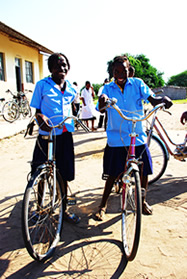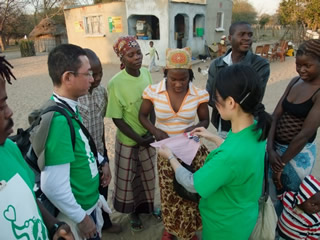
Mozambique Project
In 1998 when we formed Ehime Global Network (EGN), we studied and discussed various examples of international cooperation activities conducted by other NGOs. One of them was TAE (Transforming Arms into Ploughshare) Project of Mozambique. This was an unprecedented local citizens-oriented peace-building activity. We found that such a grass-root activity has to “continue” doing. In those days, the motto of the EGN was “Think globally and act locally (later in 2002, we added “change personally” from the slogan of the Earth Summit in Johannesburg)”, and in 1999 we started assisting this activity as our first step. We have been collaborated with the local organization to continue supporting this operation.
“TAE” plus “Eco & Peace”
Vasco da Gama, a Portuguese explorer, reached the shore of the current country of Mozambique in 1498, after sailing via the tip of the African Continent. In the beginning of the 16th century, the Portuguese returned to Mozambique with intention of colonizing the region, which was the beginning of colonial expansion and in the mid 17th century, Mozambique was completely taken over by Portuguese. In 1964, people waged freedom fight which ended in 1974. In the next year, they became independent from Portuguese, and Samora Machel became the first president. Unfortunately, however, from 1976, FRELIMO (Mozambique Liberation Front) and RENAMO (Mozambique National Resistance) started a civil war for 16 years until the peace agreement was concluded in 1992. This civil war was a proxy war between communist countries and capitalist countries during the cold war.
 It was said that “child soldiers” were created in this civil war in Africa. In 1992, when the war was over, a project called “TAE (transforming arms into ploughshare)” was started, in which people collected the arms among the citizens through disarmament and peace education. The activity was named after the phrase from the bible. From 1995, arms and ammunitions were collected, 95% of which were destroyed, and the remaining 5% were cut into smaller pieces and transformed into artworks by local artists who have appealed the peace to the world. One of the outstanding aspects of this project was that the activities have been conducted mainly by Christian Council of Mozambique (CCM) collaborated with government, police, army and ordinary citizens. When the CCM started the project, a Japanese NGO sent some illegally-parked and abandoned bicycles and pedal sewing machines to exchange weapons, and EGN also launched the activity to send some useful relief goods from Matsuyama to Mozambique.
It was said that “child soldiers” were created in this civil war in Africa. In 1992, when the war was over, a project called “TAE (transforming arms into ploughshare)” was started, in which people collected the arms among the citizens through disarmament and peace education. The activity was named after the phrase from the bible. From 1995, arms and ammunitions were collected, 95% of which were destroyed, and the remaining 5% were cut into smaller pieces and transformed into artworks by local artists who have appealed the peace to the world. One of the outstanding aspects of this project was that the activities have been conducted mainly by Christian Council of Mozambique (CCM) collaborated with government, police, army and ordinary citizens. When the CCM started the project, a Japanese NGO sent some illegally-parked and abandoned bicycles and pedal sewing machines to exchange weapons, and EGN also launched the activity to send some useful relief goods from Matsuyama to Mozambique. In 1999, EGN brought an opinion to the Matsuyama City Office, saying that the city can give away illegally-parked and abandoned bicycles to NGOs/NPOs free of charge. This interpretation was officially included into the ordinance. Later in 2000, EGN sent 100 such bicycles to Mozambique for the first time. To date EGN has sent 660 bicycles along with some other daily necessities such as sewing machines for grownups and stationaries for children. However, we are facing some challenges. The main purpose of TAE Project was to disarm the people. Therefore they knew how many weapons were collected/destroyed in total. Unfortunately however, they have not conducted any researches to find out what happened to the bicycles we sent.
In 1999, EGN brought an opinion to the Matsuyama City Office, saying that the city can give away illegally-parked and abandoned bicycles to NGOs/NPOs free of charge. This interpretation was officially included into the ordinance. Later in 2000, EGN sent 100 such bicycles to Mozambique for the first time. To date EGN has sent 660 bicycles along with some other daily necessities such as sewing machines for grownups and stationaries for children. However, we are facing some challenges. The main purpose of TAE Project was to disarm the people. Therefore they knew how many weapons were collected/destroyed in total. Unfortunately however, they have not conducted any researches to find out what happened to the bicycles we sent.
 As EGN has supported the project, we launched a pilot research to implement so-called “Eco & Peace” as a new activity in 2006. This was a complementary project to tailor to the local people’s needs to the ever-changing societies and helped achieve their better lives. The purpose of this project was to establish a circulatory society with zero weapons and zero waste. EGN has decided to launch the activities mainly in Malengane, Moamba in Maputo. EGN became a registered NGO in Mozambique. Although our activities were very small, we have many voluntary operations with the local people.
As EGN has supported the project, we launched a pilot research to implement so-called “Eco & Peace” as a new activity in 2006. This was a complementary project to tailor to the local people’s needs to the ever-changing societies and helped achieve their better lives. The purpose of this project was to establish a circulatory society with zero weapons and zero waste. EGN has decided to launch the activities mainly in Malengane, Moamba in Maputo. EGN became a registered NGO in Mozambique. Although our activities were very small, we have many voluntary operations with the local people.On-site Study Tour
 We visited the villages where we had sent bicycles and other supplies to see how they use and maintain our bicycles in order not to become give-and-given relationship. We also visited the sites to witness how they collect and destroy weapons and unexploded bombs. Recently Mozambique, Maputo, the capital, in particular, has steadily developed their economy by 7% annually. In some areas, however, the development of the social infrastructure was desperately retarded. There are some villages where they slowly improve their living standard by developing fair trade products by themselves. We chose 3 sites for comparison for our study tours which is helpful for us to understand ESD (education for sustainable development.)
We visited the villages where we had sent bicycles and other supplies to see how they use and maintain our bicycles in order not to become give-and-given relationship. We also visited the sites to witness how they collect and destroy weapons and unexploded bombs. Recently Mozambique, Maputo, the capital, in particular, has steadily developed their economy by 7% annually. In some areas, however, the development of the social infrastructure was desperately retarded. There are some villages where they slowly improve their living standard by developing fair trade products by themselves. We chose 3 sites for comparison for our study tours which is helpful for us to understand ESD (education for sustainable development.)
Leaning plus Acting is equal to ESD
A social problem of “illegally-parked-and-abandoned bicycles” is one of the byproducts of mass production-and-consumption of developed countries. A practice of “collecting weapons and building peace” is a social problem in Mozambique in Africa. EGN connected the two separate issues with “education”, and our challenge was introduced as a good learning example of UN’s DESD (decade for education for sustainable development). ESD was proposed by Japan in 2005 to create a more sustainable future. This was a practice of NPO collaborated by Matsuyama city government. Because this was involved by primary schools, secondary schools, high schools and universities as well as other local citizens, this was spotlighted as a participatory education and learning practice for all citizens.In May 2008, when President Guebuza of Mozambique visited Ehime, Mr. Ali, then education minister (prime minister in 2010) gave a lecture at Ehime University. From next year, Ehime University and Lurio University in Mozambique concluded the agreement of ESD research exchanges, and now they are conducting various collaborative researches and studies.
Committee for hosting President Guebuza and ministers
 On May 31, 2008, after the meeting of TICAD IV (Tokyo International Conference on African development) in Yokohama, President Guebuza and 32 high officials including ministers of foreign affairs & cooperation, education and public works & housing visited Ehime Prefecture. President Guabuza was the first head of state who visited the prefecture. EGN formed a committee to host the delegates. They visited Ehime University, Ehime Shinbun local newspaper company, and a private company called Ikee based in Ehime.
On May 31, 2008, after the meeting of TICAD IV (Tokyo International Conference on African development) in Yokohama, President Guebuza and 32 high officials including ministers of foreign affairs & cooperation, education and public works & housing visited Ehime Prefecture. President Guabuza was the first head of state who visited the prefecture. EGN formed a committee to host the delegates. They visited Ehime University, Ehime Shinbun local newspaper company, and a private company called Ikee based in Ehime.Inviting trainees & hosting seminars
From 2002, EGN invited NGOs from Mozambique to host study sessions. We also invited 6 Mozambican trainees in total for the purpose of nurturing human resources to carry out “Eco & Peace” Project in the country. They learned farming and sewing in Japan. The training costs were covered by Japan International Cooperation System (JICS) and subsidy from Japan Post.Establishment of Japan-Mozambique Friendship Association
In 2006, we formed a committee to launch “Japan-Mozambique Friendship Association” to strengthen and maintain friendship with Mozambique, and in October, we established the association. A civic group from Kurume City in Kyushu which had first sent abandoned bicycles to the country, people of Sakai City in Osaka, the birthplace of bicycle, students and business people as well as researchers on the country became the original members of the association and they have been active to maintain the ties between Japan and Mozambique.
